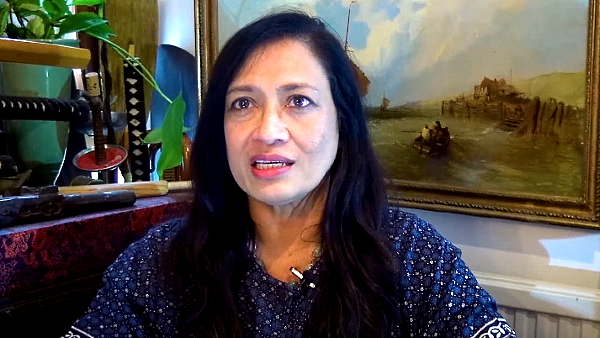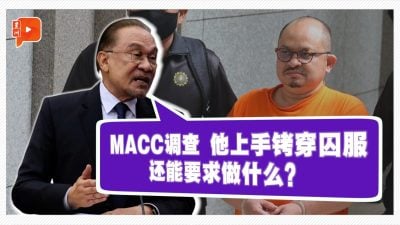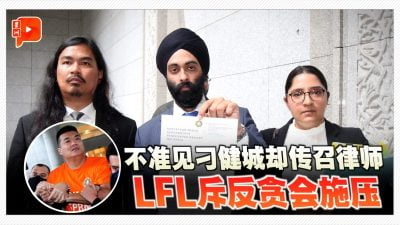
When will the PM mend the corrupt and broken civil service?
The allegations about Azam Baki, head of the Malaysian Anti-Corruption Commission (MACC), have brought the MACC into further disrepute, but it does not surprise us.
What is surprising is the reaction of various high ranking politicians.
Some claim that Azam is a victim of revenge politics. Others say his enemies are out to get him, but would that not be true of just about anyone in parliament?
In Malaysia’s toxic politics, someone you consider your friend is quite possibly aiming to occupy your seat. The same happens in the civil service. The higher you climb, makes power, position, and the ear of the most powerful person in the land the most sought after.
If Azam had nothing to hide, he should have come clean as soon as the allegations first broke.
Hanging on and hoping the issue would go away has only worsened his position.
He acquired several million shares in 2015 and 2016, but the necessary procedures were not adhered to at the time he purchased the shares.
Why were the guidelines not observed? Did he declare his assets? Where did he acquire the money to obtain these shares?
One politician suggested that Azam could afford to purchase them. This politician is daft because that is not the point. The integrity of our civil servants is the focus here.
The Azam scandal and the manner in which he prevaricated and badly handled the allegations has brought into question his integrity and the integrity of his whole department.
People do not want the head of the anti-corruption commission to be involved in allegations of impropriety. This is what the rakyat are angry about.
Whatever the reasons, the allegations involving Azam have exposed four things which are intertwined. They are:
1. The official rules and regulations of working in government, a.k.a. the code of conduct for civil servants, are often ignored.
2. “Keluarga” or kinship or blood ties matter. More often than not, family members are roped in to do something illegal.
3. The unofficial code of conduct which can be loosely translated as “I help you, you help me, or there goes your periuk nasi (rice bowl)”, must be observed. Ignoring the unofficial and unwritten rules may result in demotion or social isolation.
4. Ketuanan Melayu. Members of this brotherhood will do everything to protect one another.
For simplicity, this is the timeline of the allegations about Azam.
On October 26, investigative journalist Lalitha Kunaratnam, who is also a consultant researcher for an anti-corruption agency, published an article in the website of Independent News Service (INS) which is an independent newspaper, about the allegations made by the blog, “Edisi Siasat”.
In her article, Lalitha detailed the allegations of “Edisi Siasat” which said the Chief Commissioner of MACC is linked to several companies, some of which constitute a conflict of interest, especially as he heads the MACC.
After the publication of Lalitha’s article, INS suffered a DDOS attack and was offline for several days. The blog was hacked.
On November 12, a member of the MACC’s Consultation and Corruption Prevention Panel, Dr Edmund Terence Gomez, alerted the panel’s chairman Borhan Dolah and told him about Azam’s alleged ownership of around two million shares in a public listed company.
He requested an urgent meeting to discuss the “critical issue of national interest”.
Borhan’s response towards Gomez’s request was lukewarm, and in the end fizzled out to nothing.
Gomez wrote twice more to Borhan. This time, he included more information about Azam’s family’s business dealings.
He also mentioned that the website which had published the allegations had been hacked.
Gomez also wrote to the chairman of the MACC’s Anti-Corruption Advisory Board Abu Zahar Nika Ujang.
In each of his three communications, he relayed the same information that Borhan had received. However, Abu Zahar failed to respond.
On December 14, the Harapan MP for Sungai Buloh R Sivarasa filed an urgent motion in parliament, seeking the Dewan Rakyat to discuss Azam’s alleged ownership of close to two million shares in a public listed company.
On December 27, having failed to convince either Abu Zahar or Borhan about the seriousness of the Azam scandal, Gomez was forced to tender his resignation. He expressed deep regret that both men were “unconscionable” and “extremely irresponsible”.
On January 5, when the pressure grew too intense, Azam issued a daft statement that he “did not immediately respond to the allegations” on his shareholdings because he believed he had done “nothing wrong” and that he was “only answerable to the MACC Advisory Board”.
Abu Zahar Ujang, chairman of the MACC Advisory Board, claimed that after meeting Azam, he was convinced that there was no criminal conduct nor conflict of interest, when Azam acquired millions of shares in two companies.
This only made the rakyat angrier. Both Abu Zahar and Borhan failed to take their jobs seriously, and Dr Gomez had been forced to resign.
Abu Zahar then tried to discredit Dr Gomez and claimed that the board had wanted to tell the public, but Dr Gomez did it first.
On January 6, aware that the damage control tactics had failed, Azam decided to sue the whistleblower.
He demanded an apology and RM10 million in damages from Lalitha.
If he had any sense, Azam should resign or step down until his name is cleared. Suing the whistleblower has only enraged the rakyat more.
Source:
- Independent News Service: Business Ties Among MACC Leadership: How Deep Does It Go? (Part 1)
(Mariam Mokhtar is a Freelance Writer.)
ADVERTISEMENT
ADVERTISEMENT










-400x225.jpg)





























